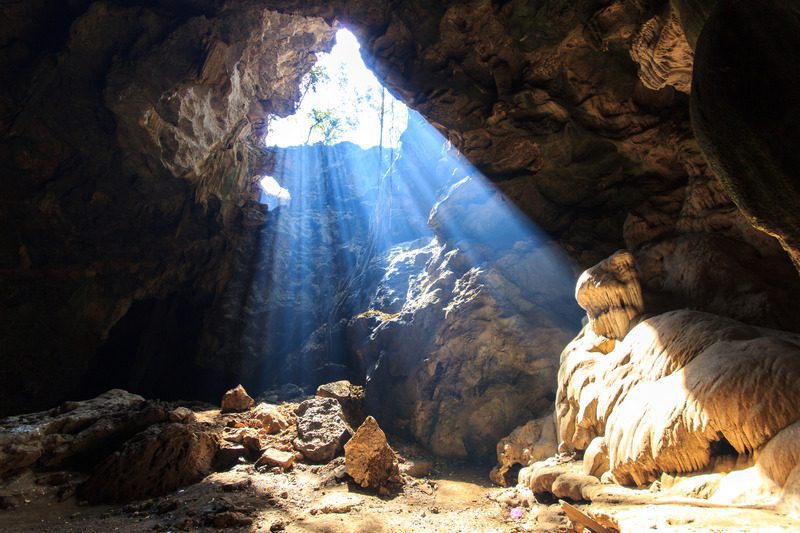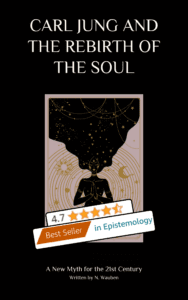Table of Contents
Plato’s Allegory of the Cave
Plato’s Allegory of the Cave can be found in Plato’s book The Republic. Plato used the allegory of the cave to indicate that the reality which we humans perceive to be real is only a projection. According to Plato, the real truth is hidden from humanity because we are stuck in a ‘cave’ “I want you to go on to picture the enlightenment or ignorance of our human condition somewhat as follows. Imagine an underground chamber like a cave […] In this chamber are men who have been prisoners there since they were children, their legs and necks being so fastened that they can only look straight ahead of them and cannot turn their heads.” (p.241)
These ‘prisoners’ would then only be able to look at a wall in front of them, upon which, as a result of a fire burning inside of the cave, and all sorts of things happening between the prisoners and the fire, all sorts of projections would form.
Despite of all kinds of things happening around them and despite of being fellow prisoners inside of this cave, the prisoners would, according to Plato, only be able to perceive these projections: “They are drawn from life, I replied. For, tell me, do you think our prisoners could see anything of themselves or their fellows except the shadows thrown by the fire on the wall of the cave opposite them?” (p.241)
Getting out of the Cave
As a result, for the prisoners, the only true reality would be the one projected upon the wall: “in every way they would believe that the shadows of the objects we mentioned were the whole truth.” (ibid) The only way for the prisoners to discover the real truth would be for them to leave the cave.
Plato argued, however, that the prisoners would not be inclined to do so voluntarily. Plato believed that, if a prisoner would turn his head and look around the cave, or would actually leave the cave, the fire and the light from the outside world would hurt his eyes to such a degree that it would be impossible for the prisoner to see clearly. Even if he would look straight at the truth, he would not be able to see it clearly: “And if he were made to look directly at the light of the fire, it would hurt his eyes and he would turn back and retreat to the things which he could see properly, which he would think really clearer than the things being shown him.” (p.242)
If, however, a prisoner would be forced out of the cave and would therefore have no other choice but to become accustomed to the light outside, he would eventually conclude that the things he previously considered to be the only true reality, were in fact mere projections. As a result of this newfound wisdom, the prisoner is likely to decide not to return back to the cave: “it won’t be surprising if those who get so far are unwilling to involve themselves in human affairs, and if their minds long to remain in the realm above.” (p.244)
Even if the prisoner were to return, Plato believed that the other prisoners would not be tempted to listen to the returning prisoner because, upon his return, the returning prisoner would make a fool out of himself because, being accustomed to the outside light, the prisoner would at first not be able to see the shadows clearly: “they would say that his visit to the upper world had ruined his sight, and that the ascent was not worth even attempting. And if anyone tried to release them and lead them up, they would kill him if they could lay hands on him.” (p.243)

Implications
Plato argued that this allegory of the cave has several implications. Plato argued that it would mean that we should rethink education: “We must reject the conception of education professed by those who say that they can put into the mind knowledge that was not there before – rather as if they could put sight into blind eyes.” (p.245)
Instead, Plato indicated that education is best aimed at training the eye to be able to look directly at the light of reality, for which the entire mind must be turned: “Then this turning around of the mind itself might be made a subject of professional skill, which would effect the conversion as easily and effectively as possible. It would not be concerned to implant sight, but to ensure that someone who had it already was not either turned in the wrong direction or looking the wrong way.” (p.245)
Secondly, the government, according to Plato, should compel those who have managed to leave the cave to share their knowledge with the entire community. Although the escaped prisoner might not want to do so, he should be compelled because it will benefit the entire community: “it uses persuasion or compulsion to unite all citizens and make them share together the benefits which each individually can confer on the community; and its purpose in fostering this attitude is not to leave everyone to please himself, but to make each man a link in the unity of the whole.” (p.247)
In fact, Plato argued that these ‘philosophers’, who have ascended from the cave should govern society because they, having seen the light, will eventually also be able to understand the shadow world a lot better: “You must therefore each descend in turn and live with your fellows in the cave and get used to seeing in the dark; once you get used to it you will see a thousand times better than they do and will distinguish the various shadows, and know what they are shadows of, because you have seen the truth about things admirable and just and good.” (p.247)
These philosophers might, as mentioned before, prefer to stay in ‘the realm above’. According to Plato, however, this is exactly what will make them good politicians: “The truth is quite different: the state whose prospective rulers come to their duties with least enthusiasm is bound to have the best and most tranquil government, and the state whose rulers are eager to rule the worst.” (p.247)
Conclusions
Plato’s Allegory of the Cave is rather complex because it can be interpreted in many different ways. I believe, however, that there are two important conclusions that we can derive from this allegory, especially in relation to our current society.
The first conclusion is that we humans are in several ways blind to the truth and that we do not really posses the capability to transcend this blindness. This is the case because any attempt to look away from the shadow projections will be extremely painful and difficult. If we keep this idea of Plato in mind, we might remember not to look away when ‘the light’ blinds us because this is only a necessary part of transcending the shadow world.
The second conclusion is that those that have managed to ascend to ‘the realm above’, should be the ones leading our societies because they will then be able to share their knowledge and because of their disinterest in human affairs they will be the least corrupt. With this idea in mind, we should remember to carefully listen to those that claim to have found a new ‘truth’, because of our blindness we might be tempted to make a fool out of them, even though they might be right: “And so our state and yours will be really awake, and not merely dreaming like most societies today, with their shadow battles and their struggles for power.” (p.247)
Thank you for reading! And please let me know if you have derived any other interesting conclusions from this allegory.

